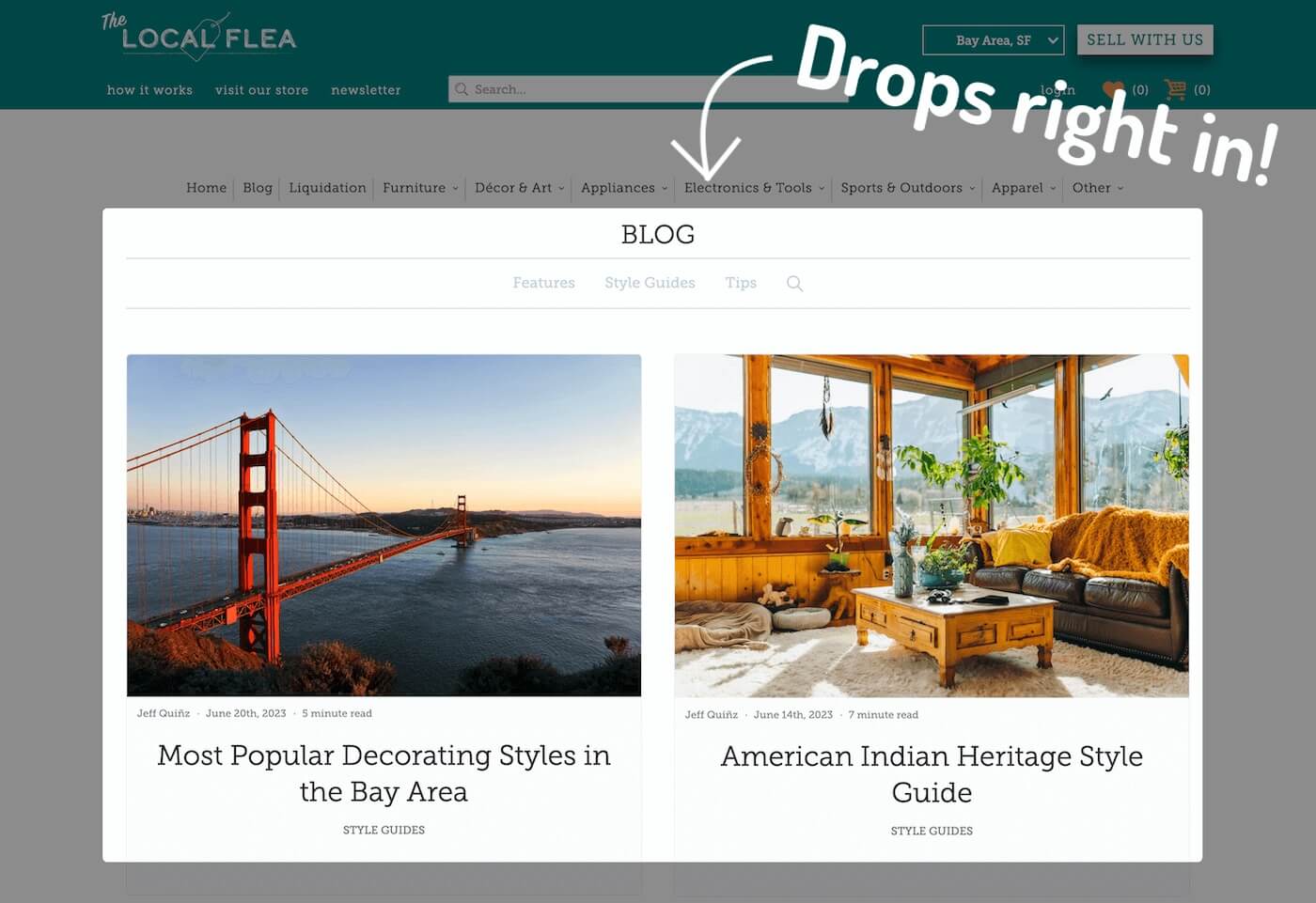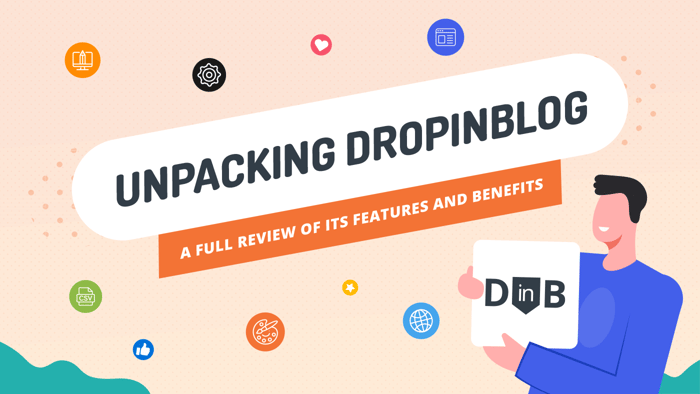In its simplest form, Duda is a site builder that also provides e-commerce tools. For this reason, it’s particularly well suited for end-users, but it doesn’t stop there – it also caters to agencies of any size, including larger SaaS businesses and even hosting companies.
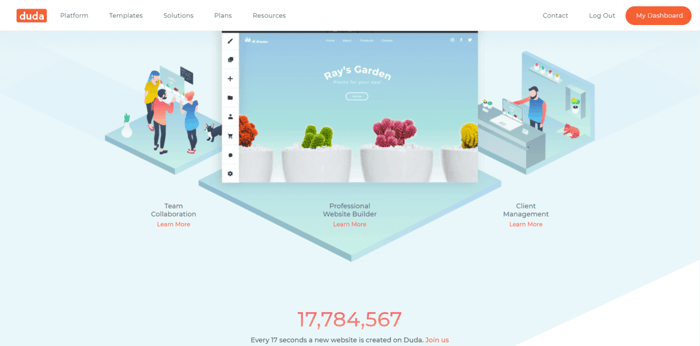
Wix is one of the most widely known site builders. There’s almost no way that you aren’t already familiar with the name.
Just like Duda, Wix includes e-commerce tools in its toolkit. Unlike Duda, though, it’s more suited to smaller businesses rather than agencies, hosting companies, or larger businesses.

One thing these platforms have in common is that they are both extremely user-friendly. In this Duda vs. Wix comparison, we’ll explore what else they have in common, as well as what the major differences are between them. Our aim is to provide you with sufficient information to help you understand Duda and Wix better and see if one of these platforms is a suitable candidate to run your business on. So, let’s get to it.
| Duda vs. Wix: A quick comparison | ||
| Duda | Wix | |
| Who’s it best for? |
|
|
| Design and Customization |
|
|
| Pricing |
|
|
Table of Contents
Customer Reviews and Popularity
Customer Reviews
Based on the user reviews on the popular review website Capterra, Duda holds the lead over Wix ever so slightly. It beats Wix in all relevant categories: ease of use, customer service, features, value for money, and likelihood to recommend.
However, the big caveat is that Wix’s scores are based on almost 10,000 reviews, while Duda’s scores are derived from around 200 reviews (at the time of writing). Typically, the larger the number of reviews, the harder it is to keep high ratings. So, this may not give the whole picture.
It’s a similar situation with another very respectable review site, G2. Here too, Duda has a better overall score. It has the upper hand over Wix in several different categories, like the ease of use, whether it meets requirements and quality of support. However, again, Wix has significantly more reviews than Duda.
Popularity
When considering Duda vs. Wix, the difference in the number of reviews can be explained by how popular the two platforms are, or more precisely, how widely known they are.
An indicator of the popularity of a platform is the number of total visits per month. According to Similarweb, Wix recorded over 41.5 million total visits in August 2024 and ranked at number four worldwide in the category of web hosting tools. Duda received just over 500,000 visits in the same period and ranks 232nd.
Of course, this doesn’t necessarily mean that one is better than the other, but it does explain why there aren’t as many reviews on Duda as there are on Wix.
Who Uses Duda and Wix?
G2 gives some additional insights into Duda vs. Wix in terms of user demographics. Based on the reviewers’ profiles, Duda and Wix are most popular among small business owners, and the majority of the reviewers of both platforms work in the marketing and advertising niche.
A much bigger study on Enlyft confirms that the bulk of Wix clients belong to the category of small businesses. Enlyft also shows that Duda is most popular amongst small business users.
Design and Customization
Editor
Duda
Duda offers a drag-and-drop editor with an intuitive and clean interface. It’s easy to use and find the tools you need.
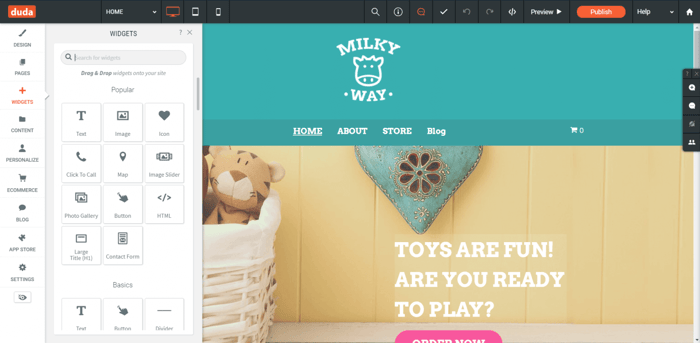
The Duda site editor includes widgets (the basic building blocks of a page), global design options that enable you to modify aspects of your whole site extremely easily, the possibility to add e-commerce tools, access to third-party integrations, and even the ability to add a blog.
The Duda editor has a clearly defined structure – rows and columns – which means you don’t have total freedom with this drag-and-drop editor. Essentially, it makes it difficult to put a new element exactly where you want to.
However, this is a fairly common approach to drag-and-drop editors, and very few of them are completely free-form.
Wix
There are two options with Wix: let the AI-based Wix ADI (Artificial Design Intelligence) system create your site automatically or use the regular editor and build it on your own.
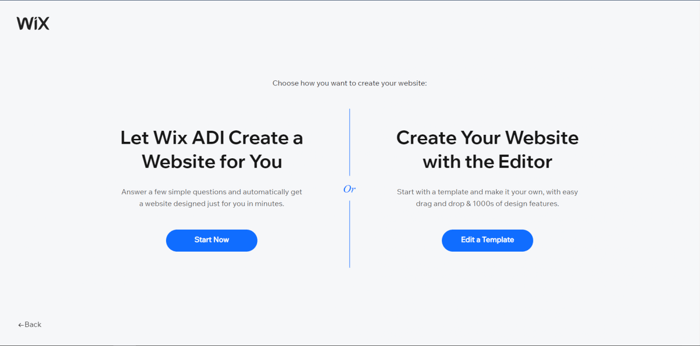
If you pick the second option, you’ll have the choice to build your site from different templates – for example, a blog, e-commerce store, or personal site. Depending on the template you select, you’ll see something like the following:
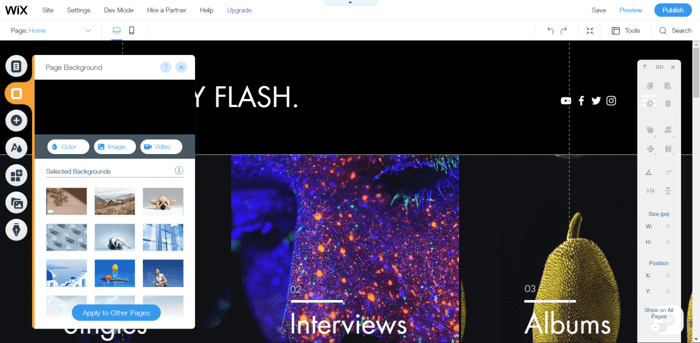
This is subjective, but to us, the Wix editor is a bit crowded with tools and definitely overwhelming. It’s simply not as tidy as the Duda editor.
The Wix editors allow you to do so many things. You’ll be able to add pages, customize the background, and add a “strip” – a kind of content block for buttons, images, menus, blogs, or social icons. If that’s not enough, there is also a huge range of extensions on the Wix App Market that you can connect to extend the functionality of the platform even further.
One really cool thing about the Wix editor – unlike Duda – is that there are no limitations on where you can place an element. You have complete freedom to move elements all over the canvas. Some users really love the creative freedom it gives them, but there is the risk that without any digital design skills, this can result in unprofessional-looking sites.
Sometimes the Wix editor can be a bit slow, possibly due to the large number of features and tools, but most of the time, it works just fine.
Templates
Duda
Quantity-wise, Duda has a modest offering of about 120 templates. But aesthetics-wise, the templates are very good. They’re well-designed, modern, and elegant.
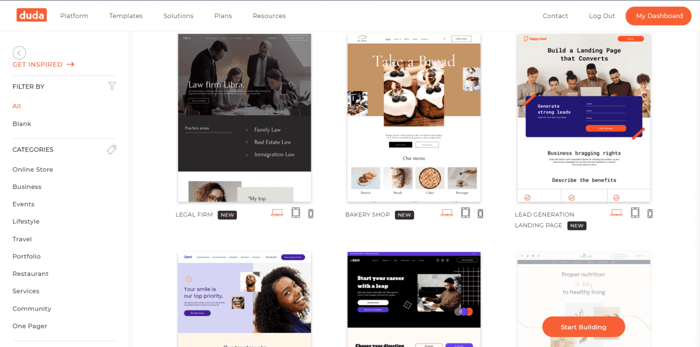
All the templates are customizable and responsive. Duda puts a lot of emphasis on their sites being mobile responsive, which is not surprising because the company actually started as a specialized platform for building mobile sites.
Duda has pre-designed templates for a number of section types like footers, intros, teams, pricing tables, and testimonials. There’s also the possibility to “save as template” entire sections that you create yourself and add them to new pages you create later in order to maintain a style across all your website.
One feature Duda shares with Wix is that both platforms have the blank template option, allowing you to create a site completely from scratch.
Wix
Wix’s library of templates contains a lot more templates than Duda’s. There are templates for anyone and anything: the e-commerce store owner, the hairstylist, the merchant, the artist, the blogger, or the cultural nomad. The likelihood that you won’t find what you want is slim.
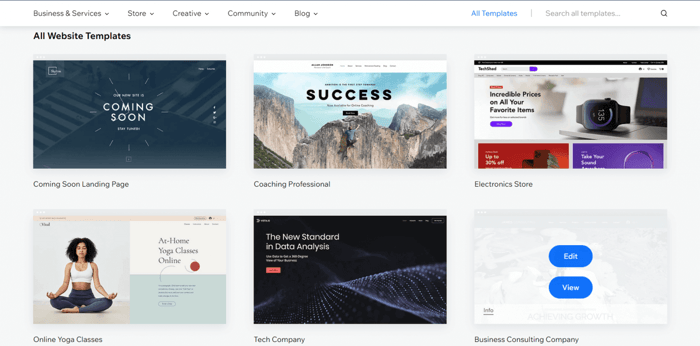
However, there’s one problem: the Wix templates are not fully responsive. This is pretty strange, considering that nowadays, mobile devices are more widely used than desktops. You’d be hard-pressed to find any other site builder or e-commerce platform that doesn’t include fully-responsive designs.
It does appear that Wix is trying to catch up with its competition in regard to mobile-ready sites, but it isn’t quite there yet.
Similar to Duda, once you choose a template, you can’t switch. For instance, in both Wix and Duda, every time you pick a different template, the platform treats it as if you’re trying to build a new site.
If you use the Wix ADI, Wix does give you the possibility to choose from a collection of so-called themes. However, the themes are not full templates as you know them but more like different versions of the same template.
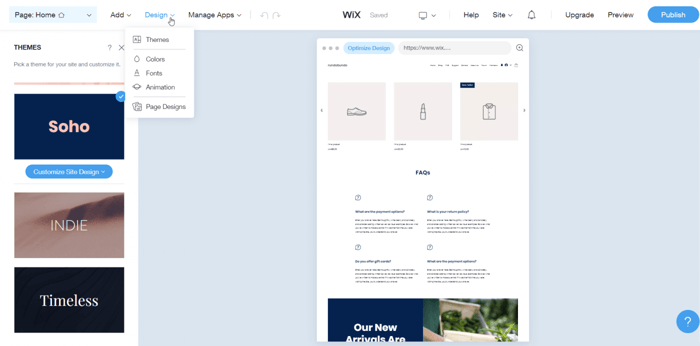
Customization
Duda
When it comes to customization, Duda provides you with more or less all the usual options that a drag-and-drop editor offers. You can customize the text, layout, and colors, as well as add any images, buttons, icons, or dividers. You can also modify the navigation bar.
However, the real power of Duda lies in the ability to use the developer mode for customization purposes. You just need to click the icon beside the “Preview” button, and it’ll take you there:
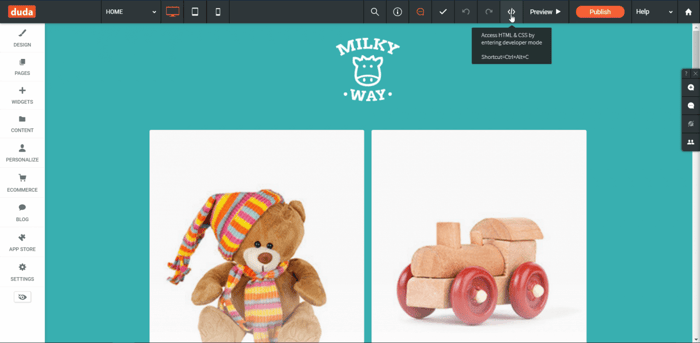
This is what you’ll see next:
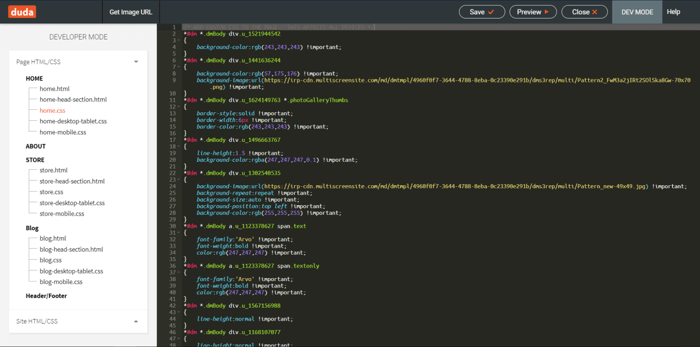
Clearly, here you can change your site’s HTML and CSS code and make it look exactly as you want. That doesn’t mean that you can’t do enough with the editor alone, but if you know how to code and you really want to go the extra mile with customization, then you’ll appreciate this option.
In case you need even more options, Duda allows for further customization. You can use the JavaScript API, the Widget Builder, and the REST API. Check out the Duda Developer Portal for more information on this.
Wix
What was said about the Duda site editor applies to the Wix editor as well.
When it comes to exploring and making use of other options, Wix keeps a few tricks up its sleeve too. Wix Velo is a development environment that lets you extend the platform’s capabilities.
To access this feature, you’ve got to turn on the developer mode, which is available only to those that didn’t opt to use Wix ADI for site construction.
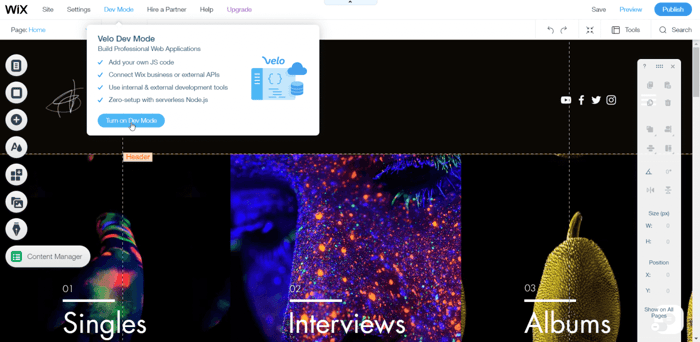
By entering the dev mode, you get an opportunity to write your own code in the masterPage.js file and do some other cool stuff.
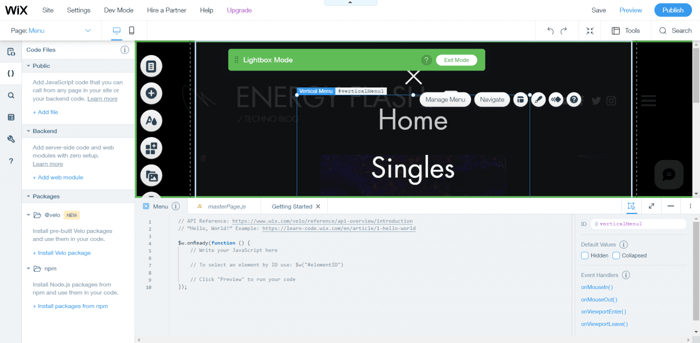
It’s difficult to effectively evaluate how the developer modes for each platform compare, but it does appear that Duda has a structure that is easier to navigate.
Pricing
Duda
Standard Plans
Duda offers four standard pricing plans:
1. Basic Plan:
For $19/month (billed monthly) or $14/month (billed annually), these are the features the Basic plan includes:
- One website
- Reliable and fast Amazon Cloud hosting
- Customization options
- HTTPS for safe websites
- Multiple languages
- Direct access to the App Store (but keep in mind that the Duda App Store is not one of the platform’s stronger features, and the number of available extensions is much lower than on Wix)
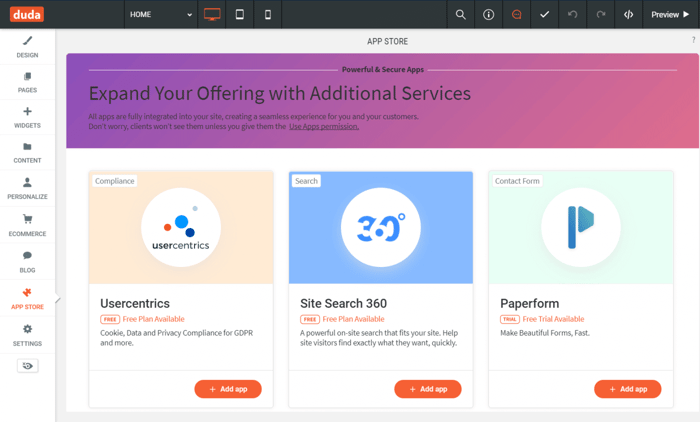
- A large library of free and paid images
- Limited access to a content library (which, in this case, means the ability to manage pictures, files, and elementary business information from a centralized location)
- Collaboration with one team member
- Email customer support (available on business days from 12 a.m.–6 p.m. PST, in addition to which you can find help on the official support page, Duda University, and the platform’s blog)
2. Team Plan:
The Team plan includes everything from the previous plan, plus expanded access to the content library, additional phone and chat support, and up to four team members instead of only one.
It costs $29/month (billed monthly) or $22/month (billed annually), and you’ll enjoy access to the following additional features:
- Assigning different levels of access to your team members
- Building and sharing templates across all the sites controlled from your account
- Hiring experts and agencies partnered with Duda
- White labeling
- Different levels of client permissions
- Site comments for more efficient teamwork and quick feedback from your clients
- Stats, analytics, and regular email reports
- Sales and marketing materials
- Limited access to dynamic pages (a complex feature explained well in this article on the Duda website)
Duda doesn’t offer a free plan, but it offers a 14-day free trial of the Team plan. In addition to what was listed here, with this plan and the free trial, you get an opportunity to add a blog to your site.
The Duda native blog is not bad, but since this is not its primary purpose, the blogging experience can be a bit underwhelming. If you’re serious about blogging, you’ll need a tool that’s all about blogging, like DropInBlog.
DropInBlog integrates with Duda, it’s super-easy to use, and it offers a free trial, so it’s worth a try.
3. Agency Plan:
The Agency plan costs $59/month (billed monthly) or $44/month (billed annually) and includes every feature from the Team plan.
However, you can build up to four sites, collaborate with 10 team members, have full access to the dynamic pages feature, and enjoy the benefits of priority support. The following are the extra features added to this plan:
- Website export (Duda allows you to export both the code and the content of your site and install them on any external server)
- Widget builder that enables you to create custom solutions for your website
- Ability to create a host of pages based on only one page
If you’re an agency, Duda allows you to have custom pricing for your clients, while Wix charges your clients according to the plan of their choice. In contrast, your clients don’t have access to how much you pay to Duda as an agency owner. Duda also allows agency owners to duplicate sites with one click.
4. Custom Plan:
The custom plan provides everything that the Agency plan provides, but you can choose the number of websites you can build, there’s no limit on the number of team members, there are some more advanced customization options available, and you get round-the-clock dedicated support.
The pricing is customized individually depending on your requirements. These are the features specific to this plan:
- Instant websites
- Unlimited API calls & SSO (Single Sign-On)
- Account management
- API guidance and architecture implementation (basically, you get expert help and guidance on how to utilize the APIs potential in the context of your particular business)
- Technical, design, and sales training
- Ability to migrate websites onto Duda and access custom development services
E-Commerce Add-Ons
In addition to the regular plans, Duda offers three e-commerce add-ons. You must first have a subscription to a standard plan and then select your e-commerce add-on. This means that you pay your regular monthly subscription plus the monthly fee for the e-commerce add-on you choose.
One of the biggest advantages of these Duda offerings is that there are no transaction fees or bandwidth and storage limits.
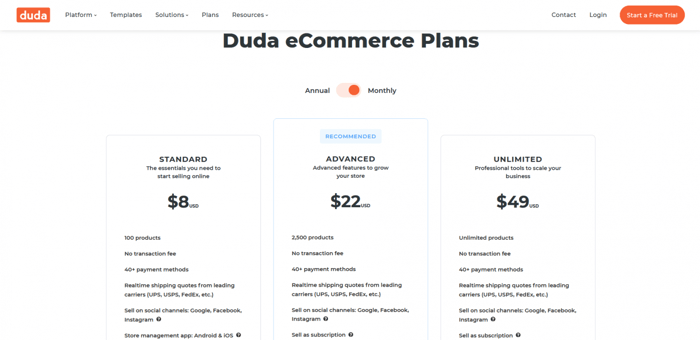
Let’s have a closer look at the three e-commerce add-ons:
1. Standard Add-On:
For an additional $8/month (billed monthly) or $7.25/month (billed annually), you will get the following e-commerce features:
- 100 store products
- Filtering and sorting by keyword, attributes, price range, or category
- Coupons and gift cards
- Over 40 payment processors
- Sale of digital products (individual files can’t be larger than 100 MB)
- Multi-channel sales (so you can sell products on Facebook, Instagram, and Google Shopping)
- Direct indexing by Google, SEO fields for products, and auto-embedded product schema (it’s worth noting that Duda follows Google's best practices and recommendations for SEO)
- Inventory tracking
- Storefront translations
- Sales and payment in multiple currencies
- Payment and shipping status tracking
- Viewing abandoned carts
- Low stock notifications
- Ability to export and import data in CSV files
- Custom tracking code on the thank you page
- Manually set-up of shipping & tax zones, rates, and rules
- Real-time shipping quotes for FedEx, UPS, and other leading carriers
2. Advanced Add-On:
With the Advanced add-on, you get everything from the Standard add-on, but you can sell up to 2,500 products and sell on Amazon & eBay, while the size of your digital products can go up to 1 GB.
For $22/month (billed monthly) or $19.25/month (billed annually), this add-on includes:
- Android and iOS apps to run your store from your mobile device
- Automatic tax calculations for the US, UK, EU, Canada, and Australia
- Mailchimp
- Retargeting with Google Analytics
- Multilingual store
- Stock control
- Digital download protection
- More advanced product filters
- Abandoned cart recovery
3. Unlimited Add-On:
For an additional $49/month (billed monthly) or $39/month (billed annually), the Unlimited add-on includes all the previous features with the ability to sell an unlimited number of products, and the size of your digital files can go up to 10 GB.
These are the additional features unique to this add-on:
- Customer groups for targeted discounts and promotions
- Discounts
- Square POS (Point of Sale)
Clearly, there are a lot of e-commerce features available with Duda, but keep in mind that e-commerce is not Duda’s strong point. Of course, this doesn’t mean the Duda e-commerce tools are worthless, but rather that there are more specialized e-commerce platforms available.
Wix
Standard Plans
One of the best things about Wix is that it includes a free plan in its repertoire. It may not be the best solution for a serious business, but you can look at this option as an opportunity to kickstart your online presence.
In addition to the free plan, there are four regular pricing plans. Wix has neatly listed the features for each plan, so let’s have a look at the following visual representation of the Wix standard plans:
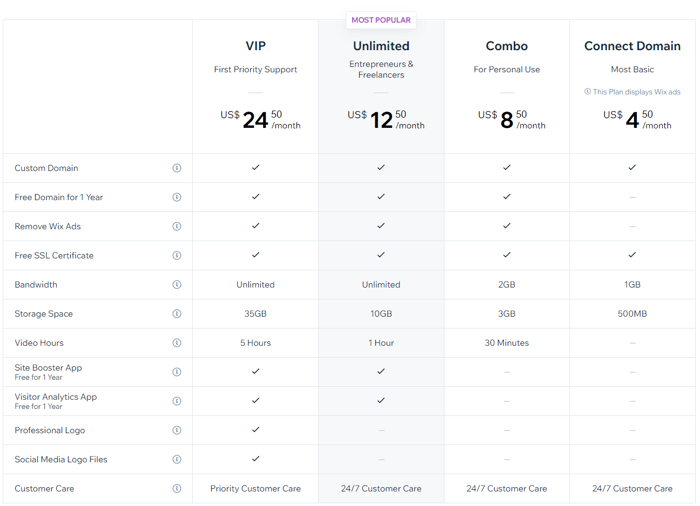
1. Connect Plan:
The first and cheapest plan on offer is the Connect plan, and it costs only $4.50/month. However, you won’t get a lot of functionality with this plan. While you can connect a custom domain, you’ll be limited to 500 GB of storage and 1 GB of bandwidth.
2. Combo Plan:
The next plan costs $8.50/month and enables you to remove Wix ads, which gives a more professional touch. In addition, you get more bandwidth and storage space, as well as the ability to post video content. To be precise, you get 2 GB of bandwidth, 3 GB of storage space, and 30 minutes of video content.
3. Unlimited Plan:
The Unlimited plan is undoubtedly the favorite of the Wix plans. For only $12.50/month, you’ll get unlimited bandwidth, 10 GB of storage space, and one hour of video time.
You’ll also get some additional tools, such as the Site Booster app and Visitor Analytics app, but only if you subscribe for a year.
4. VIP Plan:
The VIP plan is a great option for those with a more established website and higher visitor traffic. With this plan, you get unlimited bandwidth, 35 GB of storage, and five hours of video, while also being able to include a professional logo and social media logo files.
As with the Unlimited plan, you’ll also get access to the Site Booster and Visitor Analytics apps. One additional nice-to-have feature is the priority customer support, which makes the cost of $24.50/month seem like very good value.
Overall, Duda offers more features out of the box, but it’s worth noting that Wix offers more third-party integrations – many of which are free – that provide you with the same or similar functions.
One downside to the Wix pricing system is that, in contrast to Duda, not all the plans include unlimited bandwidth, and none of the plans offer unlimited storage. This also applies to the e-commerce plans.
E-Commerce Plans
Wix offers full business and e-commerce plans that all enable you to sell digital as well as physical products. All the Wix e-commerce plans include unlimited bandwidth, but each plan allows you a different quantity of features as with the standard plans. There are three plans, and these are the more general features each of them offers:
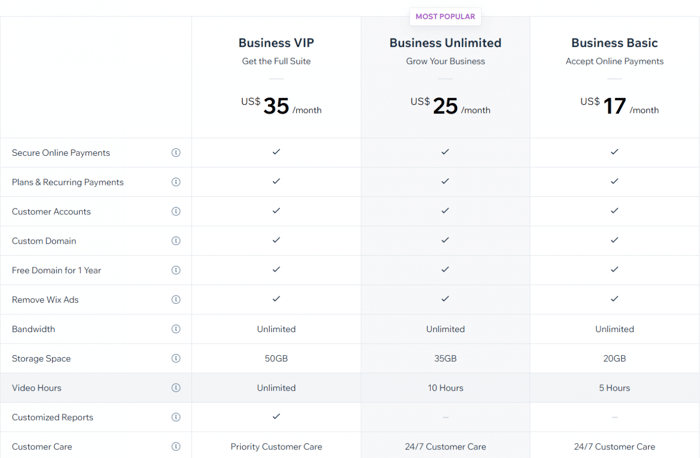
1. Business Basic Plan:
With the Business Basic plan, you will get all the basics for running an online store, including unlimited bandwidth. You get 20 GB of storage space, five hours of video time, and 25 lead-capture forms with 50 fields per form – all of this for $17/month.
2. Business Unlimited Plan:
The Business Unlimited plan is the most popular plan. At $25/month, it gives a far greater quantity of features. With this plan, you can expect 35 GB of storage space, 10 hours of video time, and up to 75 lead-capture forms with 75 fields per form.
3. Business VIP Plan:
The last e-commerce plan allows a huge amount of features, plus customized reports and priority customer support, for $35/month. You’re allowed unlimited hours of video content, 50 GB of storage space, and 150 lead-capture forms with up to 100 fields per form.
The next table is a list of more e-commerce-specific features:
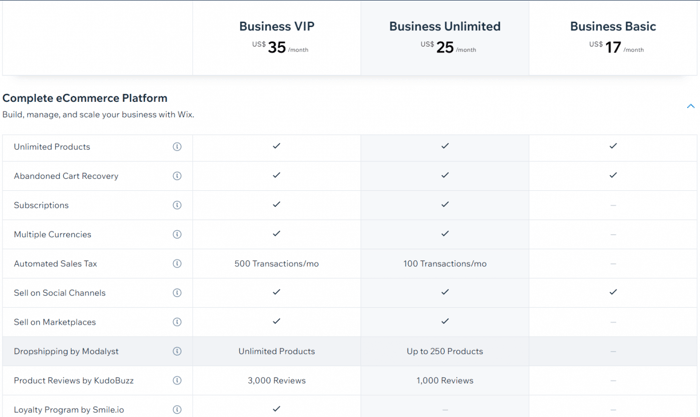
In addition to this, there are many tools that enable you to manage events and accept online bookings for appointments, classes, or courses. Restaurant or hotel owners will benefit from the tools that let you take online orders or manage reservations. Finally, artists can utilize features that allow them to promote and sell artwork and photos or offer subscriptions to video content.
Despite the limited storage space, Wix has the edge over Duda purely based on the number and wide range of available e-commerce features.
Other Points to Note
Wix offers pretty reasonable customer support, with the exception of a lack of chat support. Phone and email support is available 24/7 in English, Spanish, and Portuguese. Support is available in other languages but only on weekdays. It’s worth noting that to access phone support, you must submit a callback request.
Comparing Wix to Duda, there’s one more issue that comes to the surface: the lack of white labeling. You can remove Wix ads with three of the plans and add a professional logo with the VIP plan, but this isn’t the same as white labeling. White labeling is the process of replacing the original company branding with your own to make it look like it's your personal software that you use to provide service to other users. The lack of white labeling makes Wix unsuitable for agencies.
Wix does have lower prices compared to the Duda standard plans, but there’s a general consensus that Duda is more cost-effective considering the range and quantity of features available.
FAQs
Is Duda similar to Wix?
Yes, both Duda and Wix are very similar site-building platforms and even rank quite closely when considering customer reviews.
The striking difference is that Duda is much better suited to agencies or those with a higher level of web development experience. On the other hand, Wix is better aimed towards freelancers and those with limited web development experience who want an easy-to-use platform.
Are Duda and Wix sites SEO-friendly?
Both Duda and Wix sites are optimized to be SEO-friendly. While Duda has faster page loading times compared to Wix, Wix does have better built-in SEO tools for content marketing.
Final Thoughts
When it comes to Duda vs. Wix, it’s not easy to say which one has the overall advantage over the other.
Duda has more built-in features but far fewer integrations than Wix. Duda offers more advanced customization through coding and APIs but far fewer templates compared to Wix. On the other hand, the Wix templates are not fully responsive.
The Wix plans are cheaper, and there’s also a forever-free plan, but regarding building a site, Duda seems to be the more cost-effective platform. Neither Duda nor Wix is specifically designed for e-commerce, and as such, probably shouldn’t be your first choice for an online store. However, if you need a standard website, with some e-commerce functionality, then Wix is the better choice.
We hope that this Duda vs. Wix comparision has helped you come to a conclusion as to the best option for your online presence. The choice is ultimately yours, but be sure to try before you buy and make use of the free trial period. Whatever you choose, we wish you all the best with your online endeavors.

